Repair any of the rooms by changing the flooring necessarily provide the correct training grounds. Especially, when it comes to the regeneration of the floor tiles. In this case, it becomes almost mandatory floor leveling under tiles. By itself, the laying of tiles on the floor - painstaking work, Besides, qualitatively it may not be possible without proper training grounds and create a perfectly flat surface. That is why the question arises, how to align the floor under the tile technology.
What a way to align the use
The first question in the cases, when affected by tiling on a concrete floor becomes select how the alignment. options, of course, not many. This can be:
- improvement concrete screed;
- using self-leveling floor.
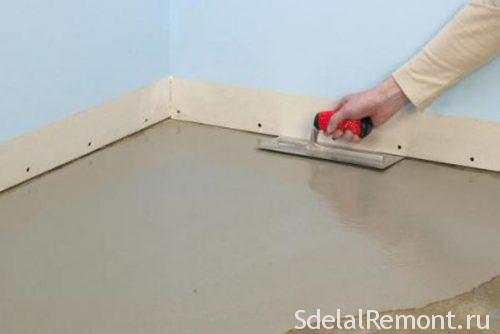
The most economical in this situation - the first way. Mixture for concrete screed you can prepare yourself. It's enough to buy cement and sand.
Additionally, you can use plasticizers Other fillers and modifiers.
Besides, and pre-mixes for screeds Sales in the construction markets today many. You can note, what concrete screed a-kind is indispensable in the case of, when the surface has a large slope, pit, cracks and other major defects.
But there is one significant negative. Drying takes place in a concrete solution for up to three weeks, and additionally have to perform waterproofing and to grind the surface after drying.
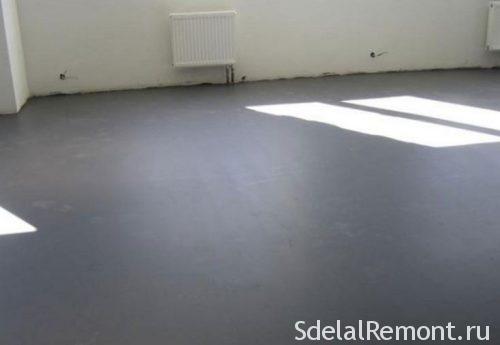
In turn, Thanks to modern production technologies, It appeared on the market a new version of mixtures, which allow to level the floor tiling. They were called tankers, or self leveling mixture.
This type of material makes it possible to significantly reduce the waiting time before starting work. Drying this mixture takes place in up to four days. The very same part of the surface is sufficient to fill in, after which it must be distributed independently by sex, then the mixture solidifies and adheres well to the base.
Forms of liquid mixtures
Self-leveling mix will help us to deal with the, how to align the floor under the tile without ties. Directly themselves solutions of this type can be distinguished two types differ in Recommended height of the screed:
- Composition for initial processing, or in other words - "rough". Such mixture must be applied to large layer, up to 2 cm. Provision for hiding major defects, biases and distinctive "waves" on the floor.
- The second embodiment becomes topcoat. This mixture was applied in a thin layer to create an ideal surface having a thickness of 2 mm and allows you to not remove significant elevation.
last, it should be noted, consumption becomes mixture. The very composition is sold in bags, usually packed 20-25 kg. Consumption, average, is 1 bag on 20 kg to raise the floor level 1 centimeter at an area of a square meter. Based on these data can be roughly calculate the amount of the required mixture.
Pay attention to the indicators, indicated on the packaging. Each has its own separate mixture density, respectively, may be different consumption. More details can be found directly from the instruction to the material itself.
Selection deposition method
And now you must decide, which is still a way to use, and the choice will affect mainly one, the most important factor - the required thickness of the layer. Respectively, itself thickness will depend on the surface roughness and the presence of defects, in this way:
- When, when the surface is not observed large variations and defects, the layer aligning the composition requires a small (to 3 cm), then use self-leveling floor.
- If there are significant deviations Substrate, as well as major defects, cracks, potholes and other, stipulation necessary alignment layer over 3 cm. In this case, inappropriate to use self-leveling floor, Besides, with such a large bed he would not mind, and in consequence of the, can not withstand the load during operation in a further. It is therefore necessary to perform a cement screed.
Technology of work
Laying and leveling floors, like any other process must necessarily carry on a particular technology. Otherwise, the result can greatly disappoint you. Next we will look at ways of carrying out each of the alignment in the form of step by step instructions.
Before, how to start leveling flooring for ceramic tiles, should prepare the necessary tools and materials, among which:
- Mix for alignment (or cement, sand in the case of carrying out the screed).
- Building drill mixer or beater-mixer.
- A set of spatulas, it is desirable to choose the broad (width of 30 cm) with a long handle.
- Mesh for reinforcing grounds.
- Roller to eliminate air bubbles. It is optional instrument, but desirable, such as the formation of bubbles entails the strength loss.
- Also useful special sole with spikes, that will go around the room not spreading the dust and debris of a.
- Building level.
- rule.
- It is advisable to purchase laser level marking.
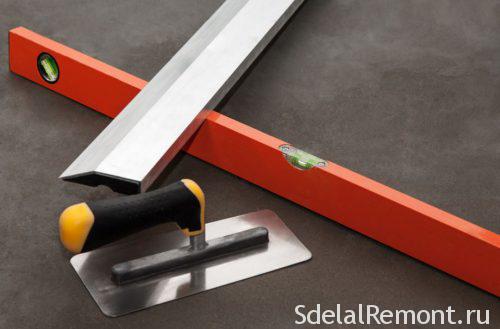
Preparing the ground for alignment
Before, begin to pour the concrete floor under the tile or screed must be prepared to carry out the surface (this step is performed identically, for self-leveling floor, and screed). In the case of work in the kitchen, bathroom or toilet, All plumbing must be removed.
Also, in considering the alignment of the concrete floor under the tile, important factor is the cleaning of the base, since the presence of oily stains and dust can damage the quality of the coating, respectively, impair its durability. It is possible to thoroughly clean all the coating of debris and dust, and residues weak old coating.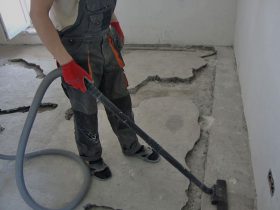
If we neglect this factor, you can compromise the final quality of the coating. Special attention is recommended to pay the corners of the room.
In case of various kinds of cracks and chips must repaired potholes, Why use:
- tile adhesive;
- filling.
The most suitable mixture can pick up almost any hardware store. Preferably well in advance primed surface with a special compound - primed with a primer. Such mixture acts as a base, and further impregnation, which greatly improves the adhesion of materials.
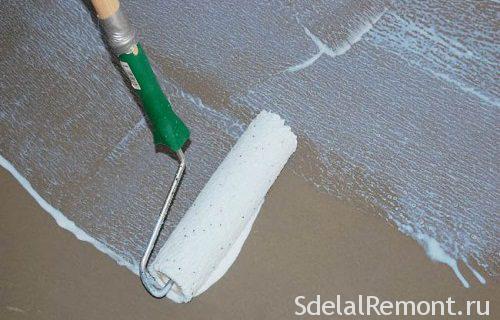
Through the use of this composition, subsequently coating dries faster and more evenly. Namely, due to the uniform grasping floor will gain greater strength and last longer.
Measurements and markings
Upon completion of the cleaning and priming can proceed to markup, on the basis of which will be held under the tile floor alignment with their own hands.
In this case, a good option would be the use of laser level. With the help of this device is easy to project zero level of the floor around the perimeter of the mark. That is what will help to avoid long measurement, calculations, labeling and other. There is enough to establish a single label, from which in the future will maintain a record.
At arrangement of self-leveling floor
It is necessary to project the level of future floor, after which the height screw screws, between which you need to pull a thread. Thus, a zero mark will be the floor is always visible.
In the absence of such a level, you can use an ordinary building, whose length is not less than 1 m. In this case, the mark will be applied as follows::
- Is applied to the first floor level of the zero mark.
- From it with a tape measure the distance slightly less than the level of construction.
- Further, we are putting a very level and set it to a horizontal position.
- The free end of the measuring device is screwed into the next screw.
- In the same way doing work around the perimeter of the room.
An important factor is the total absence of abnormalities, so it is best to choose the level with the most accurate scale, which will not make a mistake.
align the floor
And now, the completion of all preparatory work, you can go directly to a solution of, as align floors under the tiles with their hands. Separately consider self-leveling floor technology and ties.
Fill the floor with their hands
To begin to dissolve the mixture in accordance with instructions on the packaging. For, to later get the best possible coverage, you must strictly follow the technology of cooking and all proportions, specified on the package.
note, that is too dry or too liquid mixture may cause display defects on the surface after drying. In particular, when the liquid mixture is too long it will dry and lose strength, otherwise,, Conversely grab too quickly, forming irregular lumps of concrete.
Kneading mixer used building, which will allow the most thoroughly mix. You can also use a mixer. The solution should be prepared in portions, because all at once, you can not spend time to, and as mentioned, mix quickly grasp, and continue its use becomes impossible.
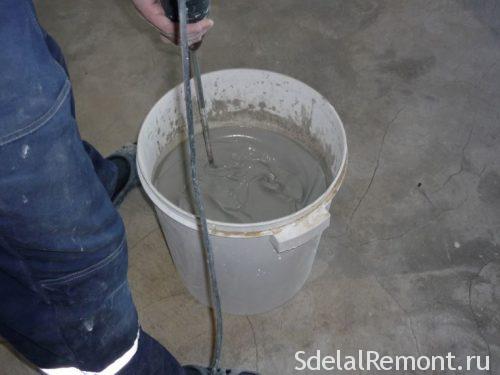
The mixture must be spread evenly over the floor surface, starting from the far corner and ending doorway. Smoothing solution is necessary with a spatula, and then laminating thereon a roller with special teeth. This helps to eliminate air bubbles from the mixture.
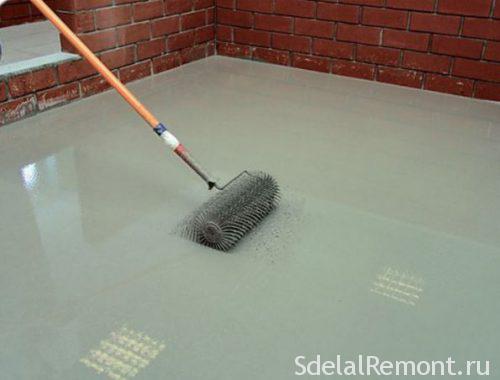
Grasp the mixture begins to occur later 30-40 minutes, because it is necessary to do the job quickly and accurately. Distracted from the process in any case be.
Besides, It recommended not to cover the entire surface at a time, and perform the work gradually. Such a step will maximize evenly distribute the solution, respectively, receive quality coating.
Also pay attention to the pace of work and the length of the strip:
- It is desirable to process the next segment until the, until wither previous edge, which will make the surface as flat, besides seamless.
- Another way would be a gradual implementation of the bands with a distance between them, which will perform a seamless part of the lower surface, up will also further finish after drying.
In order to continue to make it easier to carry out the alignment of the tiles on the floor, layer should be as uniform, Besides, desirable to apply no more than 20 solution mm. Thus, surface pick strength and rapidly dries.
Mixture itself after application solidifies later 3-4 day. Will almost ideal surface. Before you align the floor under the tile, necessary to wait drying surface.
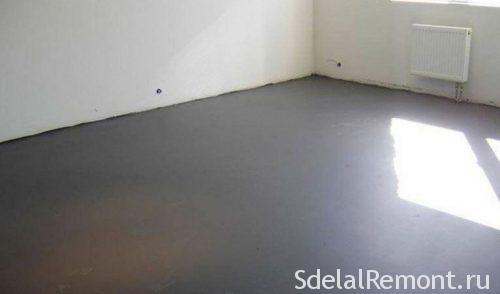
At arrangement screed
In the case of arrangement roughing screed marking the first steps are performed in the same manner, as well as for self-leveling floor. Then, depending on the layer thickness, which is scheduled to perform, In installation guide (lighthouses). Their role can act:
- Fittings.
- aluminum corners.
- Special beacons.
They are laid out in accordance with the marked level of future floor, So, to the top of the lighthouse was on par with outstretched on the perimeter yarns. Beacons are fixed via special solutions, most of them taken to secure the gypsum or alabaster, although it would be better to use grout.
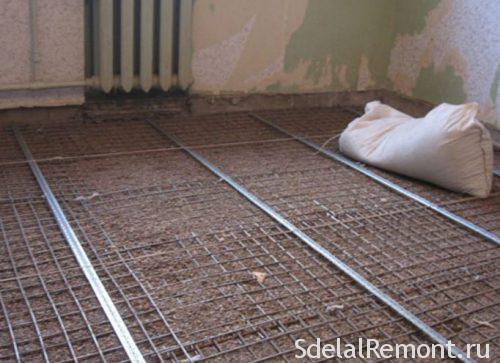
Immediately prior to the installation of beacons carried stacking wire mesh. It will help make the coating more durable. select, depending on the layer thickness, necessary and different grid. For example, when pouring a screed layer 2 cm, grid is necessary to take the thickness of the 2 to 5 mm with a cell in 5 cm. detail about floor screed on beacons.
Performing self-tie
A second embodiment of equalization, as mentioned, is an cement strainer. The technology of its performance is very similar to the self-leveling floor, but there are some characteristic differences, to be notice. Consider a step by step implementation of the screed, so that you can immediately see the very differences:
- The first thing you need to knead the cement slurry. Kneading is performed in proportions 1 to 2, where a proportion of cement and 2 the proportion of sand.
- Further, depending on the layer thickness, the solution is distributed over a small area, which should not exceed the distance arm.
- After the rough distribution of the solution it is necessary to align the, what is done with the use of rules.
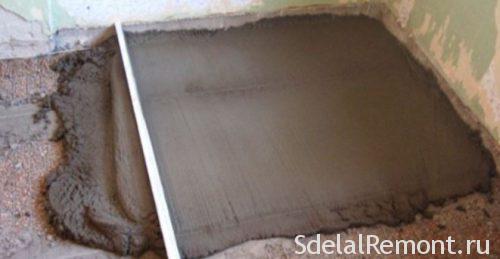
- Thus a first portion aligned, and the solution is spread after full alignment of the next.
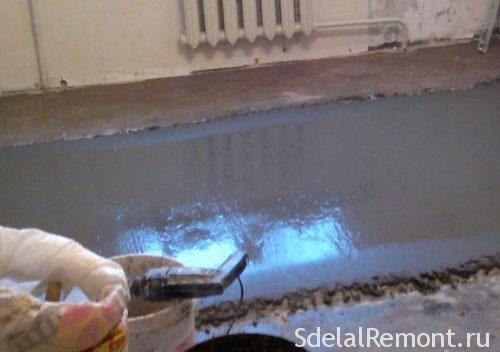
- Thus performed section by section, starting from the far corner of the room towards the door, until, until the surface of the floor is fully aligned.
The main difference in the screed becomes the, that it is necessary to fully align yourself. In the case of self-leveling floor, it quite a bit smoothed "by eye", Further the mixture itself will fully horizontal position, and you can not worry about the result. In case of a tie the same, see how, all significantly different.
In case of concrete screed laying can begin after only a few weeks, which is typical for mortars.
conclusion
In this process is complete, Now you know, how to align the floor under the tile. Besides, Article has been given an answer to the question, whether it is necessary to align the tiles, what is important and relevant. We suggest you watch some videos, which more clearly show the progress of the work.
Recommended Reading:
- Independently put a tile on the floor.
- How to choose a tile adhesive.
- How to perform a cement screed.












